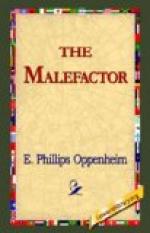“No! You might see that I have no visitors this evening. Lady Ruth is coming here at nine o’clock.”
“Lady Ruth is coming here,” Aynesworth repeated in a colorless tone. “Alone?”
“Yes.”
Aynesworth shrugged his shoulders, but made no remark. He turned towards the door, but Wingrave called him back.
“Your expression, Aynesworth,” he said, “interests me. Am I or the lady in question responsible for it?”
“I am sorry for Lady Ruth,” Aynesworth said. “I think that I am sorry, too, for her husband.”
“Why? She is coming of her own free will.”
“There are different methods of compulsion,” Aynesworth answered.
Wingrave regarded him thoughtfully.
“That,” he said, “is true. But I still do not understand why you are sorry for her.”
“Because,” Aynesworth said, “I know the history of a certain event, and I know you. It is, I suppose, for this end that you made use of them.”
Wingrave nodded.
“Quite right,” he declared. “I think that the time is not far off when that dear lady and I can cry quits. This time, too, I see nothing to impair my satisfaction at the probable finale. In various other cases, as you might remember, I have not been entirely successful.”
“It depends,” Aynesworth remarked drily, “upon what you term success.”
Wingrave shrugged his shoulders.
“I think,” he said coldly, “that you are aware of what my feelings and desired course of action have been with regard to those of my fellow creatures with whom I have happened to come into contact. It seems to me that I have been a trifle unfortunate in several instances.”
“As for instance?” Aynesworth asked.
“Well, to take a few cases only,” Wingrave continued, “there was the child down at Tredowen whom you were so anxious for me to befriend. Of course, I declined to do anything of the sort, and she ought, by rights, to have gone to some charitable institution, founded and supported by fools, and eventually become, perhaps, a domestic servant. Instead of which, some relation of her father turns up and provides for her lavishly. You must admit that that was unfortunate.”
“It depends upon the point of view,” Aynesworth remarked drily. “Personally, I considered it a most fortunate occurrence.”
“Naturally,” Wingrave agreed. “But then you are a sentimentalist. You like to see people happy, and you would even help to make them so if you could without any personal inconvenience. I am at the other pole. If I could collect humanity into one sentient force, I would set my heel upon it without hesitation. I try to do what I can with the atoms, but I have not the best of fortune. There was Mrs. Travers, now! There I should have been successful beyond a doubt if some busybody hadn’t sent that cable to her husband. I wonder if you were idiot enough to do that, Aynesworth?”




